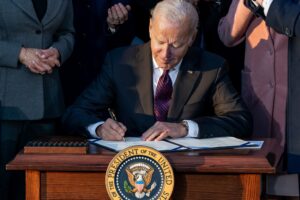
President Joe Biden signs a $1.1 trillion package of infrastructure investments on the White House lawn on Nov. 15, 2021. Official White House photo
During his visit to Boston yesterday, President Joe Biden touted his push for a cancer “moonshot” and declared that the separate federal infrastructure law his administration is implementing will be “the most significant investment” since President Dwight D. Eisenhower’s plan for the Interstate Highway System in the 1950s and will kick off “an infrastructure decade” from coast to coast.
The president spoke first at Logan’s Terminal E, where a major renovation and sustainability project is underway, after a parade of local elected officials celebrated the roughly $1 trillion infrastructure law that Biden signed in November, a law that is poised to deliver about $9.5 billion to Massachusetts over five years.
“Most of the last century we led the world by significant margin because we invested in our people and we invested in our infrastructure. We invested in ourselves, but along the way we stopped. We used to be ranked number one in the world in the investment of research and development as part of our GDP, number one in the world. Now we rank number eight. China used to be ranked number … nine, excuse me, and now they rank number two in the world,” Biden said. “We risk losing our edge as a nation to China and to the rest of the world is catching up. That stops now, with investments like we’re celebrating here today.”
In addition to the billions of dollars that the federal infrastructure law will steer to Massachusetts in the coming years, even more will be made available via competitive grants. Massachusetts is hoping to leverage the new federal funding opportunities with its own $11.4 billion infrastructure bond package that Baker signed into law last month.
“To put it in a nutshell, the bipartisan infrastructure law basically doubles the annual level of federal funding that we had anticipated to receive over the course of the next five years. And that increased spending on existing competitive grant programs also creates opportunities to invest in new programs that were part of this legislation as well,” Gov. Charlie Baker said at Logan on Monday.
The state’s infrastructure bond bill included $400 million for immediate safety improvements at the T, and U.S. Rep. Seth Moulton on Monday morning pointed out the differences between the nearly $700 million Terminal E project at Logan and the work being done during the monthlong shutdown of the MBTA’s Orange Line. The Logan project equates to $140 of investment per passenger that’s projected to use the terminal every year, compared to $3.15 for each passenger carried by the Orange Line in a year, he said, showing that “the fact of the matter is we need to do more.”
Biden then traveled to Dorchester’s John F. Kennedy Library to speak about the cancer initiative, recalling Kennedy’s own, literal “moonshot” when he launched the nation’s Apollo moon landings program in 1962.
Biden’s cancer initiative seeks to cut the disease’s death rate in half over the next 25 years, to “improve the experience” of people living with cancer and their families, and to “even cure cancers once and for all,” the president said Monday.
Cancer is the second-leading cause of death in the United States (behind heart disease). An average of 37,499 Massachusetts residents were diagnosed with a cancer each year from 2013 through 2017 and an average of 12,803 Bay Staters died of cancer each year in that span, according to the most recent state cancer incidence report.
“This cancer moonshot is one of the reasons why I ran for president,” he said. “We know this: Cancer does not discriminate – red and blue. It doesn’t care if you’re a Republican or a Democrat. Beating cancer is something we can do together and that’s why I’m here today.”
The life sciences industry employed 106,704 people in Massachusetts in 2021 with an average annual wage of $201,549 – a total of $21.5 billion in Massachusetts-based wages, according to the Mass. Biotechnology Council.
MassBIO said that the drug pipelines of companies headquartered in Massachusetts account for 7.2 percent of the global pipeline and 15.6 percent of the U.S. drug pipeline. By the end of 2025, MassBIO said, the life sciences industry expects to add between 26 million and 59 million square feet of real estate in Massachusetts. The state is also in the running to host the Advanced Research Projects Agency for Health, or ARPA-H. Dr. Renee Wegrzyn, the vice president of business development at Boston-based Ginkgo Bioworks and head of innovation at Concentric by Ginkgo, will be the agency’s first director.






